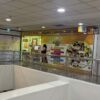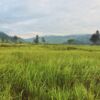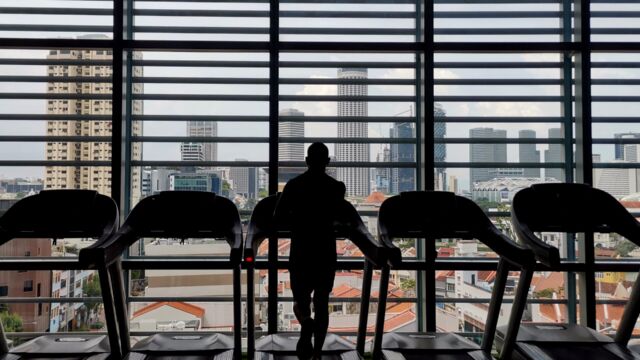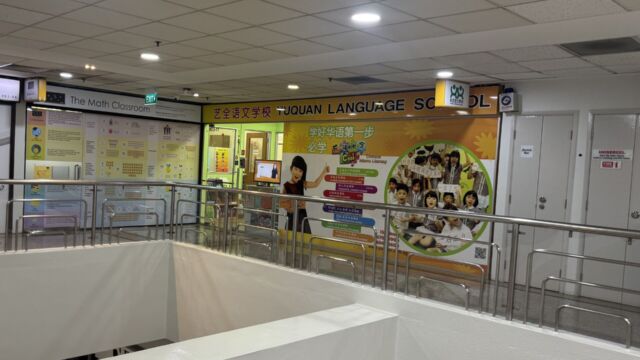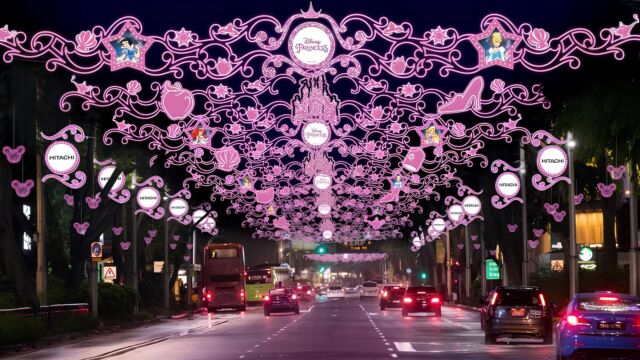I Left the Migrant Hostel a Finished Product, Ready For Shipping
A four-story "aeroplane building" in Tiong Bahru, Faye Seng's dream neighborhood. Photo: Faye Seng
A hostel | 3,206 words
Translated from Chinese by Shanna Tan
In a key trading hub like Singapore, the bunk-bed hostel is yet another temporary warehouse, not for goods, but for housing its sizable population of foreign workers. When dawn breaks, we are scattered to our respective destinations.
*
In my six years here I’ve hopped from a Short-Term Visit Pass (STVP) to a Student’s Pass to a Long-Term Visit Pass (LTVP) until, after six months of seeking a job, I finally got my long-awaited work pass. During that period of uncertainty, I held onto my LTVP like driftwood, desperately hoping to stay afloat a little longer. At job interviews, prospective employers looked as if they were the ones being put on the spot. You’re neither a Singaporean nor Permanent Resident, they said. Hiring you is not going to be easy. In my mind, I was thinking: but if I can’t land a job, how will I ever make it back to land with a more respectable identity?
Meeting someone new always comes with a series of questions about my “status.” Have you converted to Singapore citizenship? Are you a PR? If not, hard to change jobs, build a family and buy a house here, they’ll tell me, as though I am in a game of negotiation, playing by society’s rules. This is, like the exchange rate, a friendly topic of small talk. More neutral than race, more amicable than the cross-border water issue or the high-speed rail between Kuala Lumpur and Singapore – which are essentially politics in disguise.
Having graduated at the height of the pandemic, it was a huge challenge to find a job and housing. The economy wasn’t doing well, and in the labor market, “residents” were understandably prioritized. With strict cross-border travel restrictions in place, I worried that if I left the country, it’d be even harder to find a job here. I chose to move temporarily into a hostel in Outram Park, in hope of being a little closer to my dream neighborhood: Tiong Bahru.
Tiong Bahru doesn’t have Singapore’s typical high-rise HDB flats, but four or five story flats built in the pre- and post-war era that are iconic in the neighborhood. Some of the flats feature a symmetrical design resembling plane wings, earning them the nickname “aeroplane houses.” If Singapore’s housing strategy – Home Ownership for the People – is about promoting a sense of stability and belonging, looking at the aeroplane houses makes me feel as if we are free to chase after our dreams at the same time. Adjacent to Tiong Bahru, Outram Park also has its share of history. Built in the middle of the 19th century, the Outram Road Prison used to sit across from Singapore General Hospital, but it was demolished in the 1960s to make way for a mixed development of housing and retail space. Less than three decades later, it was torn down again. Some believed that business was dismal because of the powerful yin energy surrounding the plot of land that used to house an old prison and autopsy centre.
The hostel I lived in was located just one kilometer away from that stretch of history. The four-story building had changed hands recently, but before the new owner could do anything, the pandemic hit. For a while, it was repurposed to house migrant workers relocated from their dormitories as part of the safe-distancing measures. Then even as the pandemic eased, the foreign tourists didn’t return immediately, so to survive, the owner converted the rooms into cheap long-term rentals. The room I stayed in had three bunk beds. Continuing to practise safe distancing, the tenants on either side slept on the lower bunk and stowed their luggage above, while the person in the middle did the opposite. On the ground floor was a restaurant selling lok lok and casual western fare. I supposed the owner had decided to create within the building an entirely self-contained ecosystem.
*
In Singapore, if you put in the effort and wits, no problem is too difficult. Looking at the city-state’s rapid economic development reminds me of the evolution from ape to mankind – where the brain came to compensate for a lack of claws and fangs by becoming the body’s most powerful weapon. Like western medicine, Singapore’s political strategies focus on treating symptoms, weighing effectiveness against side effects to arrive at the most optimal solution. From water woes NEWater was born, and to get around land scarcity, vertical farming is now promoted, promising efficiency, stability, and quality. Over time, resilience, alongside sustainability, has come to enter Singapore’s core vocabulary.
I told my mum that I spent all my waking and sleeping hours on the bunk bed, switching the video call camera to show her my room. To my left, above me, in front – everything was wood. That moment, it felt as if my limbs were pressed in by death.
As small talk goes from my nationality, to the work pass I hold, to my marital status with its relevance to obtaining a more secure foothold in Singapore, the topic of exchange rates will at some point come up. My colleagues often say they envy me, but they never sound sincere. Wow, almost 1:4. It’s like getting a raise again. So young only and you’re earning five digits . . .
Back when the exchange rate was about 1:2, people from my hometown were already jokingly referring to Singapore as “the esteemed country,” as though seeing it through the lens of an all-pink Barbie theme park or a utopia. Compared to the so-called “cowboy town” of Johor Bahru, just across the strait in Malaysia, Singapore is clean, well-developed, and law-abiding. It’s meritocratic, and there’s no need to battle a race-based quota system or navigate household registrations across different regions. The Singapore dream exists, not just for Malaysians but for people all around the world. But because Singapore relies heavily on foreign resources and talent, it feels like people and place have become intertwined in a relationship of vested interests.
Singapore prides itself on its pristine record. Back when COVID-19 was spreading worldwide in waves, Singapore was, at one time, the model student. However, in a single month, the number of cases shot up from hundreds to exceed ten thousand, mostly due to the rapid spread of the virus in migrant worker dormitories. At that point, official figures started tabulating “local community” cases separately from those of migrant workers. The segregation was frowned upon by some, yet it allayed peoples’ fears, giving them comfort that a distance remained between them and the group most at risk.
After moving into the hostel, I found out that it had a perennial problem of pests.
*
From day one, I spotted cockroaches scurrying around, and later, a roommate jiejie, an “older sister”, had a bad bout of rashes from bed bugs. The other roommate, an auntie, insisted to me that it was because migrant workers had stayed here, making the place unhygienic. The owner blamed it on people eating inside the room.
To save electricity, the 24-hour lift started adhering to a strict schedule of nine to five, drawing complaints from the auntie who always came back from work late at night.
In the room, our belongings were all over the place. My worldly possessions as a fresh graduate comprised two boxes of books, another two boxes of miscellaneous stuff and one suitcase of clothes. Auntie, old enough to be a grandmother, was working as a lorry driver, so she was always the first one to leave early in the morning and the last to return. Before the pandemic, she used to cross the Johor-Singapore Causeway every day, so living here was just an interim arrangement. Nevertheless, she took to the new environment with ease and creativity. Beside a store-bought plastic stool, the rest of her furniture was improvised – wooden planks and small boxes as makeshift tables. She used a rod to prop up a cupboard door that couldn’t be lifted or closed properly. Compared to her, the roommate jiejie’s life was much simpler. Of most importance was her uniform, so she’d always have a set hanging to dry on the bunk bed ladder. Her biggest dream was to own a bicycle so that she could cycle to work and travel on her rest days.

The owner, who sometimes brought potential tenants to check out the rooms, was always upset at our possessions and our attempts to adapt to our environment. Hey, pack your stuff, don’t turn my place into a rubbish dump. Or else I can’t rent it out, he’d grumble. But what was left unspoken was a simpler message: such a crude lifestyle shouldn’t be seen. Even if it wasn’t as hip as in the times it’d catered to foreign tourists, the hostel still sought to put its unglamorous recent past behind it. But to demand tidiness in a room without storage space was asking for the impossible.
When I moved here, I had to give up many things overnight, things I had thought of as necessities – my writing desk, table lamp, bookshelves, wardrobe. Proper cooking utensils and access to a kitchen became luxuries I couldn’t afford, and without a fridge, I was living from day to day. There was no space for a bottle of laundry detergent, so I learnt to use laundry pods. And instead of having a collection of tea bags with my milo and condensed milk tins, I switched to 3-in-1. My suitcase functioned as my dining table and my computer desk; like the jiejie the bunk ladder became my makeshift clothes rack. I learnt to live in the smartest and most efficient way in the tiny space. I stopped ironing clothes unless necessary. Treating the room more as an overnight shelter made it feel more bearable.
*
It was supposedly a youth hostel, but it attracted a range of tenants. A couple stayed here for a period while waiting for the renovation of their new home to be completed. There was also a woman who moved in after falling out with her family, but moved out again in no time because she couldn’t stand the stuffiness and bunk beds, among other things. I was most friendly with the jiejie. She came from East Malaysia, and because of the rental spike during the pandemic, she moved in temporarily since her workplace was just an eight-minute walk away. At one point, there was also a mainland Chinese student who was finishing nursing school and starting her internship.
To get more business, the owner tried to make the place more appealing by decorating the balcony and mirrors in the common bathroom with yellow strip lights. The balcony was fashioned into a common dining area, complete with a washing machine and dryer, befitting of the youth hostel image. In truth, the balcony was only used for smoke breaks, and there was no lack of horror stories about doing laundry, making me feel as though I was the one tumbling in the washing machine, sloshed around left, right, center by the forces of life. I never lost anything, but every time I picked up my laundry, I’d find a lone sock or two, sometimes of different genders. I saw people scrambling to dig through the dryer only to pull out their wired earphones from a rear pocket, who threw in their washing net, who inserted coins but forgot to press the start button. Half a day passed, and their laundry was still as dirty, although it was the people waiting to use the washing machine whom I pitied. Would it ever be possible for everyone in a shared space to use machines properly, keep them clean, and not leave anything behind or take something extra?
*
To fit more beds into a room, the owner had the window sealed shut so that a bunk bed could go in the corner beside it. I didn’t realize until one day when I was waiting at the opposite bus stop and happened to look up.
The room was always stuffy, as if something rotten was suffocating the air. On most days, I didn’t have any job interviews, so I spent the afternoons taking groggy naps, clinging to the belief that once I found a job, I could leave this place behind.
In the beginning, I could still joke about my situation. I told my mum that I spent all my waking and sleeping hours on the bunk bed, switching the video call camera to show her my room. To my left, above me, in front – everything was wood. That moment, it felt as if my limbs were pressed in by death, and suddenly, I was tongue-tied.
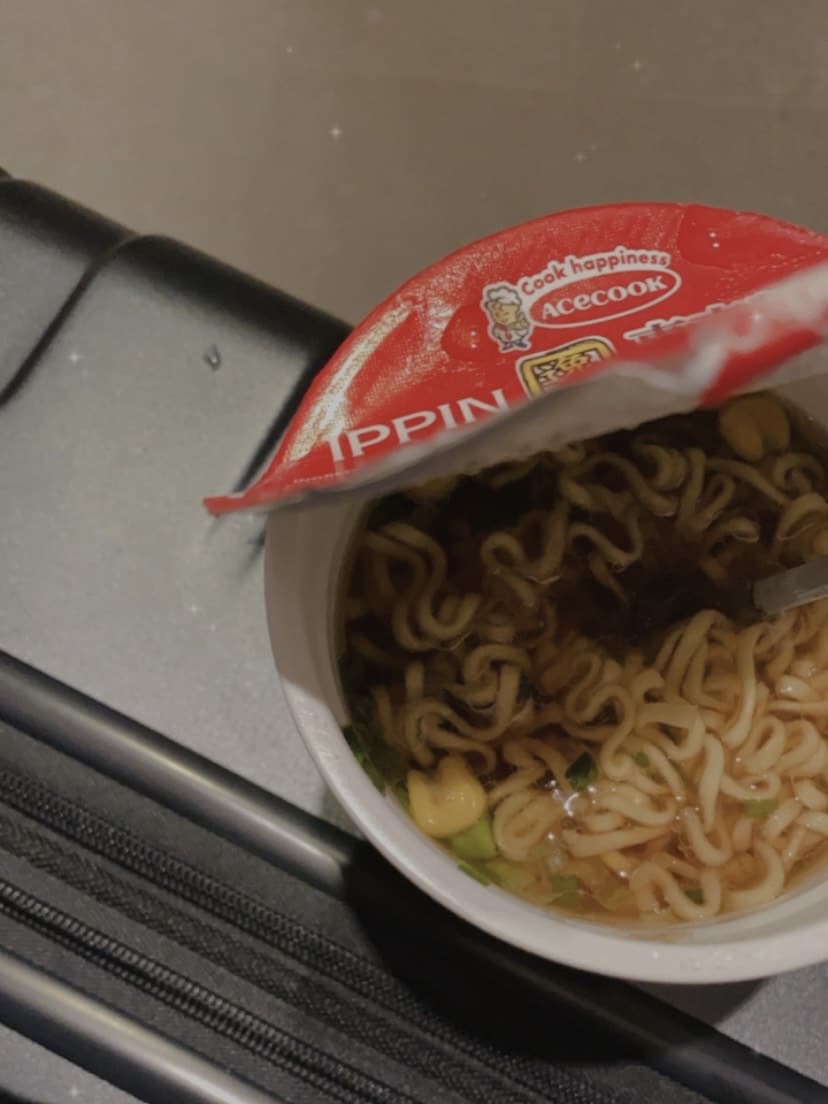
The bus stop opposite the hostel, separated by a four-lane road, was the gateway to the world beyond. One could go to Tiong Bahru, the Central Expressway or the “Big Town” at Tanjong Pagar and Chinatown, making it a busy stretch of traffic 24/7. The model answer for how to get across would be to walk the long way and use the zebra crossing, but being strait-laced was tiring. Instead, I glanced left and right before jaywalking, indulging in the thrill of freedom and potential dangers. Having a taste of life where necessities were stripped from me, I began to better appreciate the Van Gogh painting of the skull with the burning cigarette.
Before my sharp edges got sanded away by the tough reality of life, I tried to wage war against space and rules. I knew book shopping was not ideal for my room and wallet situation, but it was a source of comfort in those emotionally turbulent days. I ended up carrying a heavy stack back to the room, lining them up on the tiny ledge above the mattress.
Slowly, I began to land some freelance gigs, and found some breathing space in between the relaxings and tightenings of dining-in measures. I also started working part-time at a nearby café. On days where dining in was allowed, I felt as though I was being released from prison. It hit me, in that moment, that not being able to eat out was in fact more suffocating than having to wear a mask all the time. Sometimes, I would go downstairs to order a takeaway just to catch a breather.
Each day seemed to bleed into the next, and any small change caused great anxiety. Everyone was hoping for a turning point at the same time they sank into the comfort of sameness. I eventually grew sick of the food options downstairs, becoming someone who eats to live, and that brought about a different type of pain and loss. One day I asked the jiejie: Why must we eat? The misery of being jobless, the discomfort of the bunk bed – all these sufferings just to put food on the table. To my question, she only smiled at how I was trying to rebel against the order of life.
Sometimes I’d think we tenants were living parallel lives. Every night, the jiejie video-called her family in Sabah. One time, I said hi to her cute nieces and nephews over the phone, and we became friendly, sometimes chatting before bedtime, complaining about our lives, terrible bosses, and how our home country was useless. The jiejie wasn’t like the auntie who’d snore and let her exhaustion show all the time, nor was she like the younger nursing student who, after moving out of her school dorm, had no idea how to deal with life. Whenever the student called her family, all she kept going on about was the chaotic bustle of her internship and how lost she felt.
*
Finally, cross-border travel across the Causeway reopened, and some people resumed their daily commute. Rents continued to rise. Some people bit the bullet and paid for a whole unit, some chose to rent a room and share common areas with the owner or find housemates. Those who managed to convert their citizenship settled down here, persuading other hometown folks to follow suit. Those who chose to remain as PR ignored the teasing that they were trying to eat from both plates, keeping open the option of returning to their hometown for retirement.
A journalist’s career in the city-state’s media industry can often begin with translating English news into Chinese. “Resilience” is “jiān rèn” in Mandarin. From national defense to food safety and the labor force, Singapore strives to reduce foreign interference here.
Those who are on the Work Permit (WP) must seek the Ministry of Manpower (MOM)’s approval to marry a local or a PR, a move to prevent people from abusing the system to seek residency. The most legitimate way to remain here is to contribute to economic productivity. If not, what’s our use?
In total, I paid three months of rent to that hostel, and it was only in those exchanges that the owner would smile affably and thank me repeatedly. All other times, he was like a warehouse manager springing spot-checks on “his rooms,” and it was only because we were an all-girls room that he showed some restraint.
After securing a job and housing, I started to pack for the move. I was like a finished product ready for shipment, waiting for the warehouse door to open and the first shaft of light to touch me. Choose me, choose me. Don’t abandon me and leave me to rot in the dark. I imagined a warehouse full of Barbie dolls, each one of us packed into similar boxes. Despite minor differences, it was clear that we were the same type of merchandise.
It’s possible to settle down in this city at the same time as it’s easy to sink into a cycle of ballooning desires and aspirations, only for everything to deflate in the end. Just like the goods passing through the trading hub, this is only ever a stopover. As time passed, I don’t quite know what remains of me. I’ve lost the ability to discuss politics, or to date. Instead, I’m plagued by indigestion and insomnia.
Life here is all about calculations: Petrol tanks must be at least three-quarters full before leaving Singapore; housing schemes are tailored according to the societal group you fall under: young couples, singles, low-income families. Even the Employment Pass (EP) has a detailed point system considering factors such as salary, education, skills, diversity of employees, the proportion of local hires, and there are even extra criteria assigning points in what’s known as the “Strategic Economic Priorities Bonus.” Like its need to import fresh fruit and vegetables, the island country needs talent from beyond its shores, so the strict selection system helps to maintain a balance.

With a stable job and housing, I gradually developed new routines, and whether it’s the nail artist, salon stylist, beautician, plumber, electrician, or air-con-servicing technician I get to befriend, they’re all my “fellow countrymen.” The same conversation topics roll off my tongue easily – our hometowns, the exchange rate, how long we’ve been here, the work pass we’re on, the policies in our hometowns, the roads, the water supply. It feels less intrusive to make such small talk when we already share a similar birthplace and accent.
Sometime later, I moved again and I bought new furniture. I needed them back in my life, one at a time: writing desk, wardrobe, drying rack, fridge, bed frame, mattress . . . and I was finally able to choose my own crockery and get a French press for coffee. I found out that there was free delivery for the furniture I ordered from Johor Bahru.
Are you my dream or am I yours?
© Faye Seng
English translation © Shanna Tan
Commissioning editor: Wong Kai Hui


